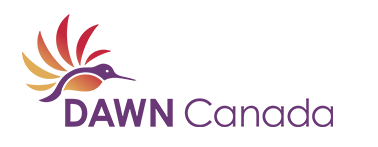2024 Pride Season - At The Intersections
.png)
In honour of Pride, DAWN Canada presents a four-month campaign to bring attention to the important intersections between disability and 2SLGBTQIA+ rights.
Each month will focus on one of DAWN’s four pillars of Advocacy, Research, Education and Policy to highlight the importance of a robust and informed framework for addressing the key issues that 2SLGBTQIA+ people with disabilities face daily.
For June, the focus is on advocacy: bringing you insightful resources and data to discuss those intersecting forces that shape the diverse experiences and barriers that we encounter from one person to another.
Since June 16 is Neurodiversity Pride Day, we will also be highlighting content that relates specifically to neurodivergence and LGBTQ.
We hope that you will find these valuable and that you will feel more equipped to discuss these concepts and advocate for your rights and those of others.
Follow us on social media and don’t miss all the valuable assets, infographics and activities that we have planned for you until September for the 2024 Pride Season - At The Intersections campaign.
List of resources by topic:
Intersectionality within LGBTQ -
- More Than A Footnote 2022 Policy Forum Summary Report - DAWN Canada (2023)
- More Than A Footnote: A Research Report on Women and Girls with Disabilities in Canada – DAWN Canada (2019)
Our “More Than A Footnote" policy forum summary from 2023 and our research report from 2019 detail the systemic barriers faced by women, girls, and gender-diverse individuals with disabilities, including issues like gender-based violence, housing, and livelihoods. Both documents emphasize the need for inclusive policies that address the intersectionality of disability and gender diversity, including LGBTQ individuals, advocating for comprehensive support and representation.
- Rooting Resilience: Women, Girls, and Non-binary people with Disabilities and the National Action Plan to End Gender-Based Violence – DAWN Canada (2022)
This DAWN Canada report provides recommendations for the National Action Plan to end gender-based violence (GBV), focusing on the systemic barriers faced by women, girls, and non-binary people with disabilities. It emphasizes the intersectionality of disability and gender diversity, including LGBTQ individuals, advocating for inclusive, accessible, and supportive policies to effectively address GBV.
- Report on State-Sponsored Homophobia: A World Survey of Laws: criminalisation, protection and
recognition of same-sex love – ILGA with the contribution of Action Canada for Sexual Health and Rights (2015)
This ILGA report from 2015 surveys global laws on same-sex relationships, highlighting the compounded discrimination LGBTQ individuals face. For LGBTQ people with disabilities, the report emphasizes their heightened vulnerability due to intersecting identities, advocating for inclusive legal protections and support systems to address their unique challenges and uphold their rights and dignity.
Neurodiversity -
- Health and Health Care Access of Autistic Transgender and Nonbinary People in Canada: A Cross-Sectional Study – Autism in Adulthood (2024)
This study explores the healthcare experiences of autistic transgender and nonbinary individuals in Canada, highlighting significant disparities in access to primary, mental health, and gender-affirming care. It emphasizes the compounded challenges faced by these individuals due to both their autism and gender identity, advocating for more inclusive healthcare practices to address their unique needs.
- Autism presentation in female and Black populations: Examining the roles of identity, theory, and systemic inequalities – National Autistic Society (2022)
This paper examines how autism presents in female and Black populations, noting systemic inequalities that lead to later diagnoses and exclusion from research and services. By applying intersectionality theory, it argues for more inclusive diagnostic practices and support systems that consider diverse gender, racial, and disability identities to better serve marginalized autistic individuals.
- Health Care Disparities Among Autistic LGBTQ+ People – Autism in Adulthood (2023)
This research identifies healthcare disparities among autistic LGBTQ+ individuals, revealing that they often face higher rates of unmet healthcare needs and mental health issues compared to their non-LGBTQ+ autistic peers. The study calls for targeted interventions to improve healthcare access and outcomes for this intersectional population.
- Elevated rates of autism, other neurodevelopmental and psychiatric diagnoses, and autistic traits in transgender and gender-diverse individuals - Nature Communications (2020)
This study reports higher rates of autism and other neurodevelopmental and psychiatric diagnoses among transgender and gender-diverse individuals. It underscores the need for healthcare providers to be aware of these overlapping diagnoses to provide appropriate support and care.
- Neurodiversity & Gender-Diverse Youth: An Affirming Approach to Care – National LGBT Health Education Center (2020)
This guide advocates for affirming care approaches for neurodiverse and gender-diverse youth, emphasizing the importance of understanding the unique challenges faced by these young individuals. It promotes practices that support their mental health and well-being by recognizing the intersection of neurodiversity and gender diversity.
Plus, we will be featuring some of the incredible work from the members of the Hummingbird Feminist Disability Coalition and our partner organizations in the coming weeks! Stay tuned...
